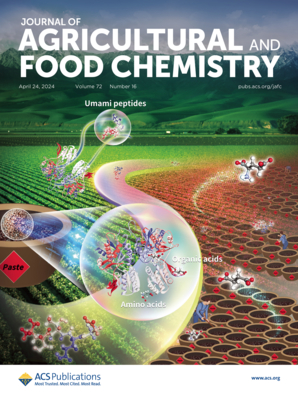β-葡聚糖修饰脂质体用于微流体介导食源性血管紧张素i转换酶抑制肽的靶向口服递送。
IF 6.2
1区 农林科学
Q1 AGRICULTURE, MULTIDISCIPLINARY
引用次数: 0
摘要
本研究提出了一种新的食源性血管紧张素i转换酶(ACE)抑制肽的口服递送系统,该系统将β-葡聚糖功能化脂质体与微流体封装和受体介导靶向结合。从蛋清蛋白中提取的RADHPFL和YAEERYPIL两种多肽通过可控的微流体自组装过程被封装到脂质体(由卵磷脂、胆固醇和DSPE-β-葡聚糖组成)中。与游离肽相比,包封显著提高了肽的胃肠道稳定性,并保持了其ACE抑制活性。将β-葡聚糖移植到脂质体表面,通过与Dectin-1受体的相互作用特异性靶向肠道微褶(M)细胞,从而促进Peyer’s patches的吸收。在自发性高血压大鼠中,与游离肽和未修饰的脂质体相比,单剂量和连续给药β-葡聚糖功能化脂质体均具有更好的降压效果。有趣的是,降压效果主要归因于肾素-血管紧张素系统的调节,肾功能和心功能的改善,以及内皮功能障碍的改善。这些发现强调了天然多糖β-葡聚糖作为脂质体系统中靶向配体的潜力,并强调了碳水化合物基材料在提高生物活性肽的口服生物利用度和生理功效方面的实用性。提出的策略为高血压管理的功能性食品或营养保健品的开发提供了一个有希望的平台。本文章由计算机程序翻译,如有差异,请以英文原文为准。
β-Glucan-Modified Liposomes for Microfold Cell-Targeted Oral Delivery of Food-Derived Angiotensin I-Converting Enzyme Inhibitory Peptides Using Microfluidics.
This study presents a novel oral delivery system for food-derived angiotensin I-converting enzyme (ACE) inhibitory peptides by integrating β-glucan-functionalized liposomes with microfluidic encapsulation and receptor-mediated targeting. Two peptides, RADHPFL and YAEERYPIL derived from egg white proteins, were encapsulated into liposomes (composed of lecithin, cholesterol, and DSPE-β-glucan) via a controlled microfluidic self-assembly process. Encapsulation significantly improved the gastrointestinal stability of the peptides and preserved their ACE inhibitory activity compared to free peptides. β-Glucan was grafted onto the liposomal surface to enable specific targeting of intestinal microfold (M) cells through interaction with the Dectin-1 receptor, thereby facilitating enhanced uptake in Peyer's patches. In spontaneously hypertensive rats, both single-dose and continuous administration of β-glucan-functionalized liposomes resulted in superior antihypertensive effects compared to free peptides and unmodified liposomes. Interestingly, the antihypertensive efficacy was primarily attributed to modulation of the renin-angiotensin system, improved renal and cardiac function, and amelioration of endothelial dysfunction. These findings underscore the potential of the natural polysaccharide β-glucan as a targeting ligand in liposomal systems and highlight the utility of carbohydrate-based materials for enhancing the oral bioavailability and physiological efficacy of bioactive peptides. The proposed strategy offers a promising platform for the development of functional foods or nutraceuticals for hypertension management.
求助全文
通过发布文献求助,成功后即可免费获取论文全文。
去求助
来源期刊
CiteScore
9.90
自引率
8.20%
发文量
1375
审稿时长
2.3 months
期刊介绍:
The Journal of Agricultural and Food Chemistry publishes high-quality, cutting edge original research representing complete studies and research advances dealing with the chemistry and biochemistry of agriculture and food. The Journal also encourages papers with chemistry and/or biochemistry as a major component combined with biological/sensory/nutritional/toxicological evaluation related to agriculture and/or food.

 求助内容:
求助内容: 应助结果提醒方式:
应助结果提醒方式:


